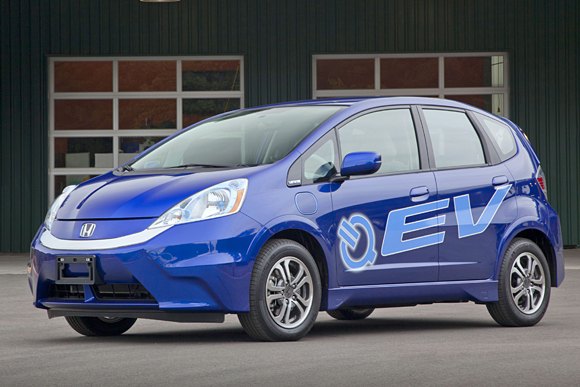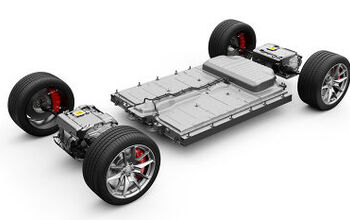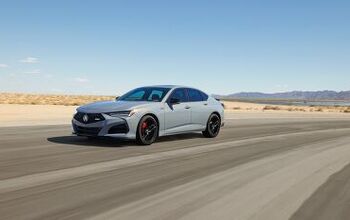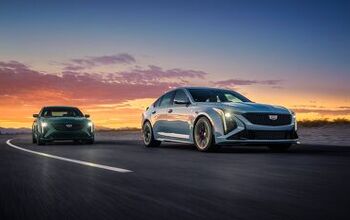Plug-in Pageant: Honda Claims Top Spot, Volt Gets 3 More Miles, Government Confuses Customers More Than Ever

We have a new winner in the MPGe brawl: Honda’s new all-electric 2013 Fit can go 118 miles on a gallon of imagined gas, measurement brought to you by your tax dollars and the EPA. Chevrolet meanwhile tweaked battery and electronics of its range-extended Volt for four miles more on the MPGe scale (95 to now 98, combined), and a slightly better electric range of 38 miles. The perception of customers remains conflicted. After all, they wanted to escape gas, and now they have to contend with simulated gallons. That’s just the beginning of the plug-in perplexity.
The electric leaderboard now looks like this:
The compilation of this table wasn’t easy. There is no single table that provides the information above. The EPA supplies conflicting information. GM does not supply the new city and highway numbers, we have to take Autobytel’s word for the data.
Speaking of conflicting data, having the Department of The Treasury as a co-owner does not guarantee preferred, or even fair treatment. A search of the EPA’s website for the official MPGe data provides the above. According to the EPA, the Volt has a combined MPGe rating of 60.
Once you head over to the government- supplied fueleconomy.gov, the MPGe rating jumps to 94 (combined) for the 2012 model. Are we confused yet? No? Ok, how about this one:
Based on alleged “real world MPG estimates,” the Volt can get anywhere between 30 and 1462 MPGe, for an average of 167.1 MPGe. I tried to contribute to the crowdsourced data and help GM by adding a few stellar MPGe “measurements.”
However, my true readings were rejected by a “The MPG is larger than expected” error message.
If my 1420 are not good enough, then why is the list crowned by three allegedly valid measurements that are higher than 1420 mpg? Why does the government specify the Volt’s mileage as 60 MPGe, then as 94 MPGe, then as up to 1462 MPGe? Why does it invite obvious fakery that drives the MPGe into the stratosphere? Why am I locked out from contributing to the fakery?

Bertel Schmitt comes back to journalism after taking a 35 year break in advertising and marketing. He ran and owned advertising agencies in Duesseldorf, Germany, and New York City. Volkswagen A.G. was Bertel's most important corporate account. Schmitt's advertising and marketing career touched many corners of the industry with a special focus on automotive products and services. Since 2004, he lives in Japan and China with his wife <a href="http://www.tomokoandbertel.com"> Tomoko </a>. Bertel Schmitt is a founding board member of the <a href="http://www.offshoresuperseries.com"> Offshore Super Series </a>, an American offshore powerboat racing organization. He is co-owner of the racing team Typhoon.
More by Bertel Schmitt
Latest Car Reviews
Read moreLatest Product Reviews
Read moreRecent Comments
- Brian Uchida Laguna Seca, corkscrew, (drying track off in rental car prior to Superbike test session), at speed - turn 9 big Willow Springs racing a motorcycle,- at greater speed (but riding shotgun) - The Carrousel at Sears Point in a 1981 PA9 Osella 2 litre FIA racer with Eddie Lawson at the wheel! (apologies for not being brief!)
- Mister It wasn't helped any by the horrible fuel economy for what it was... something like 22mpg city, iirc.
- Lorenzo I shop for all-season tires that have good wet and dry pavement grip and use them year-round. Nothing works on black ice, and I stopped driving in snow long ago - I'll wait until the streets and highways are plowed, when all-seasons are good enough. After all, I don't live in Canada or deep in the snow zone.
- FormerFF I’m in Atlanta. The summers go on in April and come off in October. I have a Cayman that stays on summer tires year round and gets driven on winter days when the temperature gets above 45 F and it’s dry, which is usually at least once a week.
- Kwik_Shift_Pro4X I've never driven anything that would justify having summer tires.






































Comments
Join the conversation
It might be easier for consumers if they took the average prices for gas and electricity and simply calculated the cost per 100,000 miles of mixed driving. That would give consumers a leg up in determining whether to pay the premium for a hybrid or electric car.
*cough* coal fired electric plants to charge Ev's *cough*